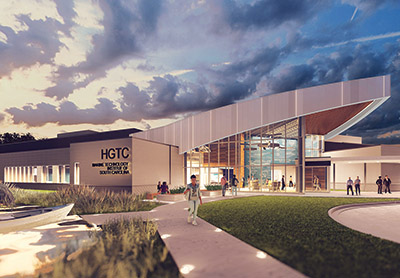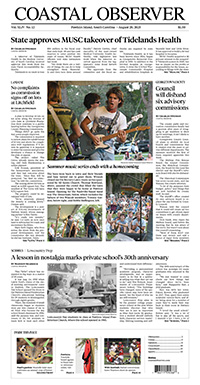Education
First-of-its-kind marine institute gets under way

Officials praised the creation of the Marine Institute of Technology on the Georgetown campus of Horry-Georgetown Tech as the first of its kind in South Carolina.
But the head of a trade group didn’t stop there.
“This will be the only one like it in the country,” said Gettys Brannon, president of the S.C. Boating and Fishing Alliance.
The 25,000-square-foot, $15 million institute will house the college’s Outboard Marine Technology and Boat Building Technology programs. Those programs started six years ago on the Conway campus and expanded to Georgetown in an existing building last year. Funding for the new facility included an $8 million grant from the federal Economic Development Administration.
“We will be able to double the size for student capacity and create new pathways for success in an industry that continues to grow,” said Marilyn “Murph” Fore, president of the college.
There are currently 24 students in each of the programs. The institute is due to be completed by the end of 2026.
Fore said Brannon pitched the idea for the institute to her in 2020, just before the pandemic. “The alliance has been instrumental in connecting Horry-Georgetown Tech with the manufacturers and is supporting our efforts,” she said.
Yamaha Marine has donated over half a million dollars worth of products to the outboard technology program, including a pair of 425-horsepower offshore outboards that stood watch over the groundbreaking ceremony on the campus last week.
Lee Rowland of Murrells Inlet, who owns MI Tide boats in Georgetown, said he has hired some of the outboard graduates. He said he was excited about the prospects for boat building students.
Boating is a $6.5 billion industry in the state, employing 27,000 people, said Robert Hucks, vice chairman of the Horry-Georgetown Tech board. There are five boat manufacturers in Dorchester County alone.
State Sen. Stephen Goldfinch praised one of them, Russ Tomlinson, president of Sportsman Boats and the S.C. Boating and Fishing Alliance chairman.
“That is a shameless plug to say, Russ, next time you’re going to build a boat, I want you to build it in Georgetown,” Goldfinch said. “This is a fantastic place to live, to grow up, to raise your kids and build boats.”
Traditionally, boat builders have trained their own employees, Brannon said. “Craftmanship’s important,” he added.
Many people think that boats are built on an assembly line in the same way as cars, Tomlinson said. They are made individually, and the college program covers the process from molds to rigging.
“Our biggest challenge is skilled labor,” Tomlinson said.
U.S. Rep. Russell Fry said programs like the institute are what make the state’s technical colleges successful.
“There is a lot of complaints in this state and across the country about higher education; that they are overbuilding, that they aren’t focused on the mission, that some of the professors might be a little crazy and say whacked out things,” he said. “So it’s really refreshing to have an institution like Horry-Georgetown Tech focus on the main thing, focus on the students.”
Fry grew up boating, although he doesn’t own one now. (“I’ll buy the gas. I’ll buy the beer” for anyone who offers to take him along, he said.) The marine institute in Georgetown underscores that area’s deep connection with the water, he said.
“Boating is not just what we need,” state Rep. Lee Hewitt said. “It is our lifestyle. It is what we do every day. When I get off work, I go home and get in the boat. That is what makes me relax, and that is what’s bringing everyone to the area.”
Hewitt, who owns three boats, is among the sponsors of a bill in the House that will exempt 50 percent of a boat’s fair market value from property taxes. They are currently taxed like cars and other personal property at 10.5 percent of their assessed value. Owner-occupied homes are assessed at 4 percent.
Goldfinch, who owns five boats, introduced the companion bill in the Senate.
“It’ll make it more affordable so we can get more people into boating,” Hewitt said.
Along with having the facility, having a boating culture is what draws students to the program, said Michael Pearson, associate professor of outboard technology at the Conway campus.
“If you like being on boats, that’s pretty much all you need,” he said.
The expansion of the college’s Georgetown campus is significant for both economic development and higher eduction in the county, said state Rep. Carl Anderson, who earned an associate’s degree in business there in 1981. He was also the first student body president of both campuses to come from Georgetown.
“This is more than a new building,” Anderson said. “It’s an investment in people.”




